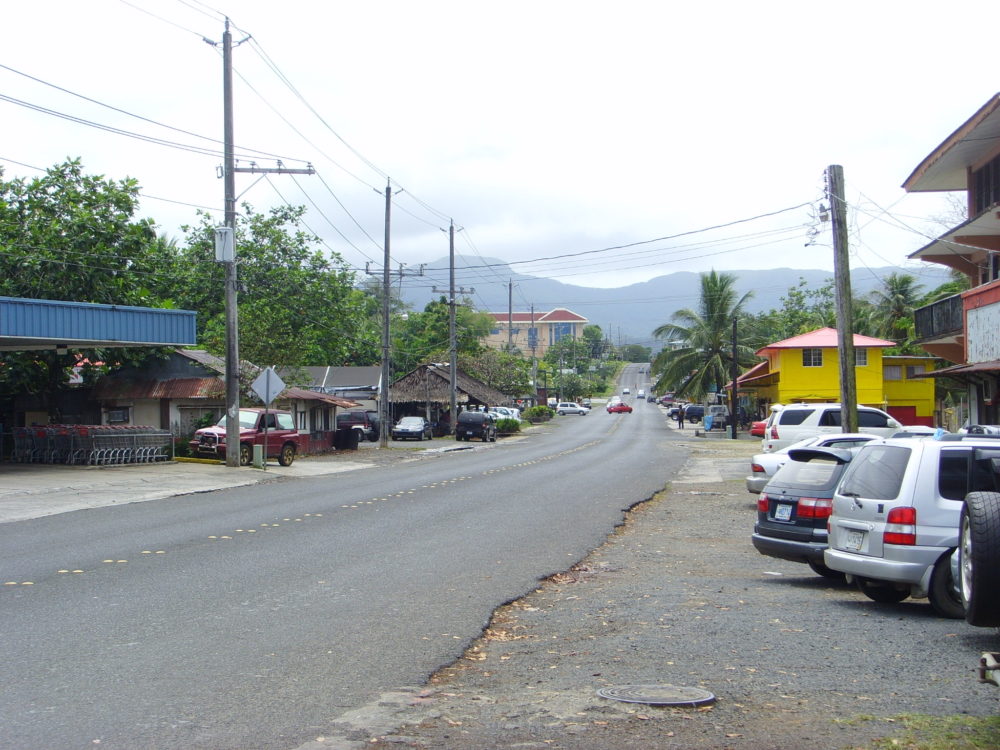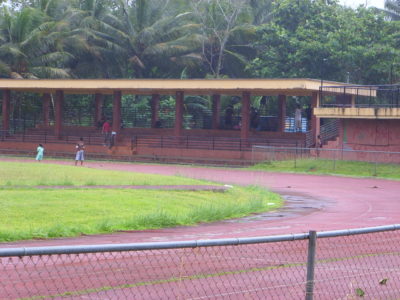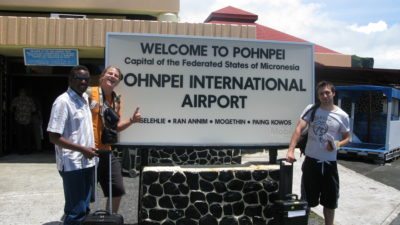Advertisement
Pohnpei's 'Premier League': How Soccer Returned To A Small Island

From the time he was very young, Paul Watson had one dream: to play soccer.
"My first passion was that I would play for England," he says. "You know, that was the dream. Despite not having any talent, really. No discernible sort of natural talent.
"And, you know, as the years went on, it got less and less likely. It was probably impossible by the age of 10, but it was absolutely impossible by the age of 18."
Paul wasn’t good enough to play for England. So he became a football journalist who kept his dream alive by playing for a semi-pro team. But he says, that wasn’t enough.
"I sort of found myself drifting," Paul says. "And at the age of 25, you know, still had this vague hope that one day I would make it in this kind of fairytale way that people do. And that's basically where this idea was born from, this kind of desire to beat the odds and not to give up on my dream of playing international football."
Trawling Through The FIFA Rankings
In 2008, Paul Watson and his flatmate Matthew Conrad found themselves reflecting on their footballing dreams, wondering what life could have been like if they had made it in the professional game.
"We would sit around in the evenings and kind of watch Brazilian second division football and sort of lament our lack of talent," Paul remembers. "And, one day, like a lot of fans probably around the world, we came up with the thing of saying, 'Well, what team could we have played for if we'd been born there?' You know, if we'd had a bit of luck, and we'd been born in San Marino, would we be playing for them now?
"You know, we trawled through the FIFA rankings, got to the very, very bottom. At the time, it was Montserrat and Bhutan and those kind of teams. And that was when we found the non-FIFA rankings — you know, places that aren't recognized by FIFA. At the bottom of that was this island, Pohnpei."
Pohnpei: it’s an island in Micronesia. Population: just over 36,000.
Advertisement
"And they were listed as the world's worst team," Paul remembers. "You know, Wikipedia told us they’d never won a game. So what we did was we sent them an email to the address that we could find for them. And that was it. That was supposed to be the end of it. But it was only actually when their head of their FA got back to us and said, 'You know, I'd love to help you, but I've just moved to London,' that we thought, 'Well, OK, this is kind of strange. It's probably a prank, but we'll meet up with him.' "
"They were listed as the world's worst team. Wikipedia told us they’d never won a game."
Paul Watson
That man was Charles Musana, a Ugandan who had spent 15 years on the island of Pohnpei playing and coaching football.
"And he said to us: 'You can't go there and play. It's harder to get a Micronesian nationality than it is to get a British one,' " Paul recalls. "You know, you have to renounce your citizenship of your country, you have to marry a local — even then it's hard to get a passport. But he said, you know, 'Why don't you come over and coach? The team's basically disbanded, so come over and coach the team.' And I think he thought we'd laugh about that and go home. But instead, we said, 'Yes.' "
At this point, Paul and Matt had no idea what they were getting themselves into. Neither of them had ever coached football before. But that didn’t faze them, and they soon got to work trying to figure out how they’d actually make this happen.
"It was a good sort of 13 months 'til we actually were able to leave because, you know, we had to save up money, we had to give up jobs," Paul says.
"Was there any point where you’re like, 'What are we doing? This is ridiculous,' '' I ask.
"For me, one of the drivers was that, through journalism, I had found myself in a job I didn't particularly like," Paul says. "I wasn't exactly living the best football life that I could be. I think people knew that I was kind of a bit bored of my current job and that I felt a little bit like I couldn't work out what to do with life. They hadn't exactly expected to hear that I was planning to go to a Micronesian island for an indefinite period of time. But I think people were almost a bit relieved that I had found something to show a passion in.
"More strangely, perhaps, is that my long-term girlfriend — and now wife, amazingly — Lizzie, basically said, 'You should do this. It's something you want to do. And if you don't do this now, you're never going to get a chance to.' I still can't properly explain it. But it was almost like a — this was the thing that my whole life had been setting up to do, in a way."
Getting Ready
"Crazy as it might seem, the thing I was most worried about, that gave me sleepless nights, was that someone would get their first," Paul says. "I had this nightmare that we would turn up, and there'd be some sort of jobbing English manager, like John Ward or someone out there. I’d think, 'Oohh,' you know, we'd obviously be completely out of our depth, and we’d just have to go home with our tails between our legs."
While Paul and Matt prepared to move halfway around the world, they spent time researching this place they were planning to go to. And as they learned more about Pohnpei and its people, they realized coaching a football team in this part of the world was going to be a significant challenge.
"We knew as much as someone can know when they've got a computer with internet access," Paul says. "We knew about the high obesity rate, high diabetes rates. We knew that they had played football, that they'd lost 16-1 to Guam a few years previously, and that that had seemed to basically knock the enthusiasm out of people in the region.
"And all these things at the time, they didn't mean anything. It was only later on — it was one of those things where, in retrospect, all these little nuggets come together and you think, 'Wow, that's why things are so difficult in terms of football there.' "

After 13 months of research, Paul and Matt finally booked their flights to Pohnpei. They were only planning to stay for three weeks to assess the situation.
"It was almost like a sort of extended job interview, except it wasn't really clear who was going to give us the job," Paul recalls. "So we thought, 'We'll do this trip, and we'll see. Is this something we can imagine working?' And then we have the option to come home, albeit without a job anymore and having made a lot of sort of quite serious — you know, I got rid of my flat. And I told everyone I know I was moving to Micronesia."
Charles Musana, the man who proposed the idea of coaching the team in the first place, would come along to make introductions.
"So he was getting messages from the island saying, you know, 'People are excited to hear there are foreign coaches coming over,' " Paul says. "You know, 'They're really all playing again. It's all getting going.'
"I don't know how true that was now, looking back at it."
Arriving In Pohnpei
In July of 2009, Paul and Matt boarded their first flight to Pohnpei.
"Pohnpei’s sort of in the middle of nowhere, is basically the best way to describe it," Paul says with a laugh. "It’s in the middle of the Pacific Ocean, between Manila and Australia, I guess. Your flight route from London is: London-Dubai, Dubai-Manila, Manila-Guam, Guam-Pohnpei. So you're a long way into the ocean."
After 24 hours in the air, Paul and Matt arrived in Pohnpei.

"It's a U.S. protectorate, so it has a bit of a U.S. feel to it," Paul says. "Uses the dollar. But in many ways, it's a tropical paradise. You know, it's this incredible, shocking greenery and beautiful blue ocean. It's absolutely stunning. It’s just such a friendly island. Everyone nods to everyone. It's incredibly laid back. You drive at about 10 mph, and you swerve around all the potholes.
"So for me, it was like, it was an amazing place, a beautiful place. But also, you know, a place that obviously has had its problems. And I think it's quite well demonstrated as you go around Pohnpei. It’s stunning beauty to your left and your right. And then there's kind of litter everywhere a lot of the time."
Paul and Matt began to make connections, meet the locals and get a sense of just how things would work on the ground.
"We met the head of the Olympic committee in Micronesia — he's called Jim Tobin, a really amazing American man who's administrated sport there for years. And he really got behind us, which was a big thing," Paul says. "The Olympic committee in a place that small is a big deal. So he was behind us. And we were going down to the field every day and just seeing what level of interest there was.
"And it would range. You know, some days we had a five-on-five kick around on this sort of flooded field. Other days, it would get up to sort of 20 people kicking around. Some days, we'd arrange everyone to turn up at 6:00 — they’d get there at 8:00. You know, it was a mess. But there was interest, and there were kids coming out and kicking a football who'd never done it before. There was some who were actually clearly really good."
As for the facilities, they certainly weren’t ideal. They would use the football pitch at Pacific Island Community School, which, despite its picturesque surroundings, really suffered due to the weather.
"The field was effectively water most of the time," Paul says. "Kind of like a marsh, in that there were toads. It was a toad habitat, so there were toads everywhere."
Next Steps
When their three weeks on the island were up, Paul and Matt returned home to plan their next move.
For Matt, that decision was taken out of his hands. He had gotten into film school — something he’d always wanted to do. But Paul decided to return to Pohnpei and take the coaching job.
There was no pay.
"That was the thing," Paul says. "In a way, this was the hardest thing. There was no salary. There's no real official job title. I mean, the Olympic Committee did eventually help us with hotels and with everything on the island. But, no, this was part of the deal.
"In a weird way, I felt more comfortable that way. Because if I'd taken on a professional role and commanded a salary, it wouldn't have felt particularly ethical. Because I would have felt I was painting myself as something I wasn't. You know, I wasn't a professional coach. I was getting more out of this than they were in many ways. So it felt like a deal that made sense."
With Matt staying behind, Paul thought he’d have to take on the challenge alone. But when he returned to Pohnpei, he met a young man named Dilshan Senarathgoda.
"He had been coaching this group of young kids. So I met up with him, and he was absolutely over the moon that I was there," Paul says. "He was delighted. So we strategized — you know, went to a bar, got drunk and strategized. And we drew up the idea of the Pohnpei Premier League.
"People were interested. So what we did was we formed a league. We marked the pitch out properly," Paul says. "We basically set times for games. And we went around the island, and we recruited teams. And we set up a tournament. And then when the tournament was played, we used that as a chance to coach, you know, teach local people to be the referees and the linesman and all these kind of things.
"So, really, that league turned it all round. Not immediately, you know, it took time. But it just caused this growth of the sport. So initially, I wasn't coaching at all, really. I was more administrating this league with Dilshan. And it was only after a few months of that league where we set up training for the most gifted of the players for them to become this kind of de facto national team."
"There were kids coming out and kicking a football who'd never done it before."
Paul Watson
Game Time
By this stage, it was 2010, and Matt had come back to Pohnpei to help out. And he and Paul set about arranging some friendly matches in nearby Guam, who are recognized by FIFA and have received significant funding for their own football program.
"So we contacted them, and they were open to having us on tour there as long as we could find a way to get ourselves over," Paul says. "The players got behind this idea that we were going to play off the island. And it was incredibly motivating for them. But it also meant we had to fight this belief that they would be thrashed. Because all they'd ever known is teams going away and being thrashed.
"I was trying to tell them to believe in themselves and to really get them pumped up and think, you know, 'We can do this.' On the other hand, half of me was thinking, 'Well, maybe we will lose 30-0.' And if we did, we'd just come back, and there'd be a sense of 'Well, what was the point in that? We may as well stop again.' "
The guys lined up matches against three different club teams, plus one fixture with a Guam Under-18 side.
"And we lost our first game 3-2 to like a Guam second division team," Paul recounts. "And the players were devastated. It was like the end of the world to them. But I've got to admit, I was ever so slightly relieved. You know, I thought, 'We can actually win one on this tour now.'
"And it was actually the second game that we played against, again, a Guam second division team. They turned up for a friendly, but for our players, it was kind of the game of their lives. So I felt quite sorry for the Guam team. They didn't really realize what they were signing up for. I remember we were, I think, 6-1 up with four minutes left.
"And I just stood on the sideline. And instead of being happy, I'm just there with clenched fists, just going, 'Clear it, clear it, clear it,' just thinking if we actually threw this away, we may as well just disband football in Micronesia for good because, you know, no one will ever believe in themselves again. But, yeah, we did, we won that game. And there was a little community of Pohnpeians in Guam who'd come out to support us. And it was kind of like this small pitch invasion, and the flag being sort of pinned on the posts. And it was just this lovely moment of a very tiny triumph, but one that meant a lot more to us."
Pohnpei went on to lose the third match 2-1 before being defeated 3-0 by the Guam youth team. But Paul says they’d already achieved what they set out to do.
"For us, what it felt like was a real vindication of the fact that, you know, Pohnpeians really could achieve something through football. And I think the players went home inspired by what they saw in Guam, because it was absolutely beyond their dreams. But equally feeling like they had competed on a level in some way — you know, maybe 20, 30 years short of getting to where Guam are as a national team. But still, you know, worthy of being put on a map with them. And I think that meant a lot really.
"I came on the start of this journey because I couldn't quite find a place in football, and I think I'd felt a disconnection with the more corporate game, the commercialization of it. And I think what I got was I got back to something a lot purer — you know, through probably the least pure route there is: this ego trip of wanting to be an international player and all the trappings that that entails, and all this rubbish that I had in my brain.
"Strip that all away and actually what I really enjoyed was just seeing people express themselves through football, and the way that they grew, and the way that they opened out. There are different worlds of football. You’ve just got to find yours. And I think I eventually found mine."
This segment aired on September 7, 2019.